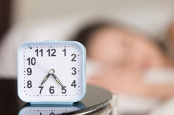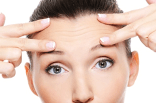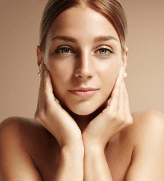BASIC FACTS
- Beauty sleep is necessary to maintain your skin looking healthy every day.
- Sleep is regulated by the circadian rhythm, in which the main mediator is melatonin, the “sleep hormone” that induces many of the skin benefits related to beauty sleep.
- Sleep deprivation has been associated with altered skin physiological parameters such as dehydration, loss of skin firmness and elasticity, and ultimately accelerated skin aging.

According to Cambridge Dictionary, Beauty Sleep is defined as the “
sleep
that you need to
feel
and
look
healthy
and
attractive
”[1]. Indeed, the concept that a good night of sleep can improve your appearance is more than real and is supported by research studying the connection between sleep and skin condition, for instance.
This article aims to explore the science behind how Beauty Sleep happens, its skin-beneficial effects, and some tips to get the most out of it.
THE SCIENCE BEHIND BEAUTY SLEEP – HOW DOES SLEEP AFFECT YOUR SKIN?
Research has shown that during sleep, our bodies undergo a
restorative process
in which it repairs the tissues (such as the skin) and replete all cellular components that were exhausted during the day, which are necessary to keep our cells functioning optimally [2].
For this to happen, it is recommended that adults have good quality sleep with a duration of 7 to 9 hours.

-
How do our bodies know it’s time to sleep to get restored?
Sleep is regulated by a process known as
Circadian Rhythm
that works as our biological clock, able to control our sleep-wake 24-hour cycle. This process is modulated by the sleep hormone
melatonin
, whose concentration changes based on the light level. Melatonin levels are reported to be higher at night (when it’s dark and time to sleep) and decrease during the day (when there is light) [2].
-
Melatonin and its skin functions.
When melanin is at its peak at night, this molecule can exert a protective activity on the skin by different mechanisms, such as:
Antioxidant support:
melatonin is a potent free radical scavenger able to fight the skin’s oxidative damage produced by external factors during the day (such as UV radiation and pollution) [3].
Anti-inflammatory activity:
melatonin can reduce inflammation by inhibiting the NF-κB pathway, which reduces the expression of numerous inflammatory markers and pro-inflammatory cytokines that were stimulated during the day by external factors such as UV radiation [3].
Mitochondrial protector:
mitochondria are cellular organelles that produce the energy (known as ATP) required for the optimal functioning of our cells. At night, melatonin helps restore the mitochondrial membrane potential, enhances the activity of the electron transport chain, and increases the production of ATP, maintaining mitochondrial efficiency at its best to supply cells with the energy necessary to repair and restore their components [3].
DNA protection:
melatonin can ameliorate the DNA damage induced by external factors [3]. For instance, the repair of skin cells with DNA damage from the sun appears to peak at night while we sleep [4].
All these mechanisms confer melatonin the ability to act as a
photo protector
against the damage of UV radiation caused during the day and exert an
anti-aging activity
by protecting the skin components (like collagen and elastic fibers) from degrading due to oxidative stress and inflammation.
-
Blood flow at night.
Skin blood flow rate also follows the circadian rhythm, showing an increase at night [4], which can improve circulation and nourish the skin cells with the necessary nutrients and oxygen to restore.
-
Sleep deprivation and its adverse effects on the skin.
Multiple studies have demonstrated the negative impact of sleep deprivation on the skin’s physiological parameters. For instance, one study associated late bedtime with a significant
decrease in skin hydration, firmness, and elasticity
, while
transepidermal water loss, sebum, and wrinkle formation significantly increased
[5]. These results were found to be correlated also with a reduction in the abundance and the diversity of skin bacterial microbiota, leading to the
impairment of the skin barrier and integrity
[5].
Literature has shown that sleep plays a key role in restoring immune system function. Consequently, alterations in the immune response may
affect the production of collagen
, which is the major structural component of the dermis providing strength, support, and integrity to our skin [6].
One study found that good sleepers, on the contrary, showed lower levels of transepidermal water loss, greater barrier recovery, and better recovery from UV damage.
Good sleepers also reported significantly lower intrinsic skin aging
scores, associated with a better perception of their appearance and physical attractiveness [7].
THE BENEFITS OF BEAUTY SLEEP
Based on the science of beauty sleep and the research supporting its positive effects to maintain our skin healthy and young, the main benefits that can be observed include:

-
Reduction of wrinkles.
Sleep helps the skin fight the oxidative stress linked to collagen degradation. A good night’s sleep can also increase collagen production and skin hydration, keeping skin firm and plump to avoid wrinkle formation.

-
Reduction of dark circles and eye bags
Having good quality sleep can reduce dark circles and puffy eyes. The increase in blood flow rate while we sleep, the anti-inflammatory effects of melatonin, and the support of skin firmness are factors that improve the appearance of the under-eye area.
Elevating your head while sleeping can further improve circulation and prevent the accumulation of fluids in the eye area.
-
Brighter complexion

Sleeping can increase the repair of UV-damaged skin signs and increase blood flow that gives color to the skin complexion. Moreover, it can even the skin tone by decreasing facial yellowness and dullness [8], giving your skin an even brighter appearance.
-
Healthier look
Sleep-deprived people can be perceived as more tired, less attractive, and even less healthy compared to when they are rested [9]. A good night of sleep can make your skin look good and refreshed, being perceived by others as healthy and attractive.
4 TIPS TO GET THE MOST OUT OF BEAUTY SLEEP
1.
Establish a bedtime routine:
fix a time to go to bed early every day and schedule a night of sleep of around 7-9 hours. You can prepare a cozy environment, listen to relaxing music/meditations or use aromatherapy to better prepare for bedtime.
2.
Stop using your smartphone one hour before going to bed:
the blue light emitted can alter your circadian rhythm and deteriorate the quality of sleep.
3.
Sleep face up:
in this way you can avoid what is known as “sleep wrinkles” that form due to skin distortion when your face is in contact with your pillow or bed surface [10].
4.
Night products with melatonin, moisturizers, or vitamin C:
you can maximize the beneficial effects of Beauty Sleep by applying before going to bed cosmetic products containing melatonin (which supports its antioxidant activity in the skin), moisturizers (which maintain skin hydrated during the night), or even vitamin C that can support collagen production.
BOTTOM LINE
Beauty sleep is real and an essential step in your “skincare routine” to preserve your skin health. Setting a bedtime routine to go to sleep early for 7-9 hours every night can prepare your skin to get the benefits of all the restorative mechanisms that happen while we sleep, to recover and repair the damage caused by external factors during the day, leading to a healthy and attractive appearance and a better perception of your beauty.
REFERENCES
[1] your beauty sleep. (2023). https://dictionary.cambridge.org/dictionary/english/beauty-sleep
[2] Brinkman, J. E. (2022a, September 19). Physiology of Sleep. StatPearls – NCBI Bookshelf. https://www.ncbi.nlm.nih.gov/books/NBK482512/
[3] Rusanova, I., Martinez-Ruiz, L., Florido, J., Rodríguez-Santana, C., Guerra-Librero, A., Acuña-Castroviejo, D., & Escames, G. (2019). Protective Effects of Melatonin on the Skin: Future Perspectives. International Journal of Molecular Sciences, 20 (19), 4948. https://doi.org/10.3390/ijms20194948
[4] Lyons, A. B. (2019, September 1). Circadian Rhythm and the Skin: A Review of the Literature. PubMed Central (PMC). https://www.ncbi.nlm.nih.gov/pmc/articles/PMC6777699/
[5] Shao, L., Jiang, S., Li, Y., Shi, Y., Wang, M. P., Liu, T., Yang, S., & Ma, L. (2022). Regular Late Bedtime Significantly Affects the Skin’s Physiological Characteristics and Skin Bacterial Microbiome. Clinical, Cosmetic and Investigational Dermatology, Volume 15, 1051–1063. https://doi.org/10.2147/ccid.s364542
[6] Kahan, V., Andersen, M. L., Tomimori, J., & Tufik, S. (2010). Can poor sleep affect skin integrity? Medical Hypotheses, 75 (6), 535–537. https://doi.org/10.1016/j.mehy.2010.07.018
[7] Oyetakin-White, P., Suggs, A. K., Koo, B. B., Matsui, M., Yarosh, D., Cooper, K. D., & Baron, E. D. (2015). Does poor sleep quality affect skin aging? Clinical and Experimental Dermatology, 40 (1), 17–22. https://doi.org/10.1111/ced.12455
[8] Matsubara, A., Deng, G., Gong, L., Chew, E., Furue, M., Xu, Y., Fang, B., & Hakozaki, T. (2023). Sleep Deprivation Increases Facial Skin Yellowness. Journal of Clinical Medicine, 12 (2), 615. https://doi.org/10.3390/jcm12020615
[9] Axelsson, J., Sundelin, T., Ingre, M., Van Someren, E. J., Olsson, A., & Lekander, M. (2010). Beauty sleep: an experimental study on the perceived health and attractiveness of sleep-deprived people. BMJ, 341 (dec14 2), c6614. https://doi.org/10.1136/bmj.c6614
[10] Anson, G., Kane, M. J., & Lambros, V. (2016). Sleep Wrinkles: Facial Aging and Facial Distortion During Sleep. Aesthetic Surgery Journal, 36 (8), 931–940. https://doi.org/10.1093/asj/sjw074

 By myulikeadmin
By myulikeadmin



